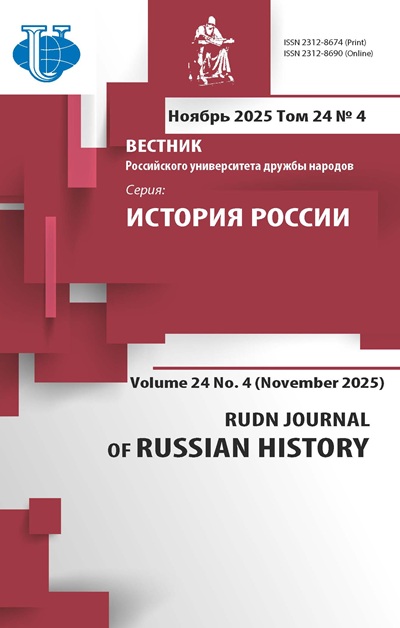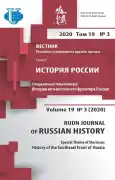Imperial Acculturation on Russian’s Southeastern Frontier: An International Survey
- Authors: Lyubichankovskiy S.V.1,2
-
Affiliations:
- Orenburg State Pedagogical University
- Samara Federal Research Center Russian Academy of Sciences
- Issue: Vol 19, No 3 (2020): HISTORY OF THE SOUTHEAST FRONT OF RUSSIA
- Pages: 727-740
- Section: SCHOLARLY LIFE
- URL: https://journal-vniispk.ru/2312-8674/article/view/321895
- DOI: https://doi.org/10.22363/2312-8674-2020-19-3-727-740
- ID: 321895
Cite item
Full Text
Abstract
This article reviews and summarizes the results of an international survey of experts about “Imperial Acculturation Policy and the Problem of Colonialism (based on the materials from the Ural-Volga and Central Asian territories)” organized in Orenburg in 2019. The questionnaire asked participants to reply with their thoughts about the characteristic features of the Russian Empire’s policy of "developing" the nomadic and semi-nomadic peoples of the Kazakh steppe, Bashkiria, Kalmykia on its southeastern frontier from the 18th to the early 20th centuries. Key questions included: The basic terminology (“acculturation,” “imperial acculturation policy”); The heuristic value of the acculturation model with respect to the “colonial approach.” Nomadic and semi-nomadic perceptions of Russian citizenship; The government’s efforts to “civilize” its nomadic and semi-nomadic subjects; The impact of military service, public education and medical care; The role of the Russian Orthodox Church in imperial acculturation policy; The persistence of ethnic identity; General trends in acculturation. The conclusion reflects on using the acculturation model to understand the integration the southeastern nomadic periphery into the Russian Empire.
About the authors
Sergey V. Lyubichankovskiy
Orenburg State Pedagogical University; Samara Federal Research Center Russian Academy of Sciences
Author for correspondence.
Email: kaf_rushistory@ospu.su
Doktor Istoricheskikh Nauk [Dr. Habil. in History], Professor, Head of the Russian History Department, Orenburg State Pedagogical University. Leading research fellow, History and Archaeology Department, Samara Federal Research Center Russian Academy of Sciences. Honorary Worker in the Sphere of Education of the Russian Federation
19, Sovetskaya St., Orenburg, 460844, Russia; 3A, Studencheskiy Line, Samara, 443001, RussiaReferences
- Breyfogle, N. “Russian colonizations: An introduction.” In Peopling the Russian periphery: borderland colonization in Eurasian history, 1–18. London; New York: Routledge, 2007.
- Burbank, J., and Cooper, F. Empires in World History: Power and the Politics of Difference. Princeton: Princeton University Press, 2010.
- Burke, P. Cultural Hybridity. Cambridge: Polity, 2009.
- Cooper, F. Colonialism in Question: Theory, Knowledge, History. Berkeley: University of California Press, 2005.
- Dzhundzhuzov, S., and Lyubichankovskiy, S. “The Influence of the Imperial Policy of Acculturation on the Formation and Evolution of the Power Elite among the Stavropol Christened Kalmyks (1737–1842).” Bylye Gody 49, no. 3 (2018): 970–979.
- Epstein, M. “Transculture: A Broad Way between Globalism and Multiculturalism.” The American Journal of Economics and Sociology 68/1 (2009): 327–352.
- Etkind, A. Internal Colonization: Russia’s Imperial Experience. Cambridge: Polity Press, 2011.
- Gafarov, A.A. Rossiyskiye musul'mane v kontekste obshcheislamskoy modernizatsii (XIX – nachalo XX vv.). Kazan: Kazanskiy universitet Publ., 2014 (in Russian).
- Godovova E.V., and Lyubichankovsky, S.V. “The manifestation of objective grounds for ethnoidentity in the everyday life of the Turkic population of the Orenburg Cossack army (second half of the 18th – first half of the 19th centuries).” Tomsk State University Journal, no. 432 (2018): 86–90 (in Russian).
- Kappeler, A. “«Rossiya – mnogonatsional'naya imperiya»: nekotoryye razmyshleniya vosem' let spustya posle publikatsii knigi.” In Mify i zabluzhdeniya v izuchenii imperii i natsionalizma, 265–282. Moscow: Novoye izdatel'stvo Publ., 2010 (in Russian).
- Kappeler, A. Rossiya – mnogonatsional'naya imperiya: Vozniknoveniye, istoriya, raspad. Moscow: Progress-Traditsiya Publ., 2000 (in Russian).
- Konev, A.Yu. “Inorodtsy’ of the Russian empire: history of concept’s origin.” Theory and Practice of Social Development, no. 13 (2014): 117–120 (in Russian).
- Khodorkovsky, M. “In what Things Russia Outstrips Europe, or Russia as a Colonial Empire.” The Political Conceptology, no. 2 (2013): 85–91 (in Russian).
- Lysenko, Yu.A. “The Russian Orthodox Church in Religious Space of Kazakhstan: Stages and Peculiarities of In- stitutional Model (XVIII – beginning of ХХ centuries).” Bylyye gody, no. 3 (2014): 387–391 (in Russian).
- Lyubichankovsky, S.V. “The periphery of the empire as a scientific problem. Review of the collective monograph: “Finding a Homeland”: Society and Power in the Middle Volga Region (second half of the 16th – early 20th centuries).” Saint-Petersburg Historical Journal, no. 1 (2015): 278–285 (in Russian).
- Lyubichankovskiy, S.V. Imperskaya politika akkul'turatsii i problema kolonializma (na primere kochevykh i polukochevykh narodov Rossiyskoy imperii). Orenburg: Izdatel'skiy tsentr OGAU Publ., 2019 (in Russian).
- Masoero, A. “Kolonizatsiya v pozdneimperskoy Rossii: istoriya ponyatiya.” In Aziatskaya Rossii: lyudi i struktury imperii: sbornik nauchnykh trudov, 340–364. Omsk: Poligraficheskiy tsentr KAN Publ., 2016 (in Russian).
- Morrison, A. “Sufism, Panislamism, and Information Panic. Nil Sergeevich Lykoshin and the aftermath of the Andijan Uprising.” Past and Present, no. 214 (2012): 255–304.
- Miller, A.I. Imperiya Romanovykh i natsionalizm: Esse po metodologii istoricheskogo issledovaniya. Moscow: Novoye literaturnoye obozreniye Publ., 2008 (in Russian).
- Redfield, R., Linton, R., and Herskovits, M.J. “Memorandum for the Study of Acculturation.” American Anthropologist 38, no. 1 (1936): 13–41.
- Remnev, A.V., and Suvorova, N.G. “Russian affair” on the Asian outskirts: “Russianness” under threat or “doubtful” cultural traders.” Ab Imperio, no. 2 (2008): 157–222 (in Russian).
- Sablin, I. Governing Post-Imperial Siberia and Mongolia, 1911–1924: Buddhism, Socialism and Nationa- lism in State and Autonomy Building. London: Routledge, 2016.
- Sunderland, W. “Empire without Imperialism? Ambiguities of Colonization in Tsarist Russia.” Ab Imperio, no. 2 (2003): 101–114.
- Sunderland, W., Holquist, P., Geraci, R., and McDonald, D. “Colonialism and Technocracy at the End of the Tsarist Era.” Slavic Review 69, no. 1 (2010): 120–188.
- Trepavlov, V.V. “Formirovaniye mnogonatsional'nogo gosudarstva v Rossii: zakonomernosti i osobennosti.” In Trudy Otdeleniya istoriko-filologicheskikh nauk RAN. 2007, 64–71. Moscow: Nauka Publ., 2009 (in Russian).
Supplementary files










